Shakespeare the Man
Shakespeare the Man
New Decipherings
Edited by R. W. Desai

FAIRLEIGH DICKINSON UNIVERSITY PRESS
Madison Teaneck
Published by Fairleigh Dickinson University Press
Copublished with Rowman & Littlefield
4501 Forbes Boulevard, Suite 200, Lanham, Maryland 20706
www.rowman.com
10 Thornbury Road, Plymouth PL6 7PP, United Kingdom
Copyright 2014 by Rowman & Littlefield
All rights reserved. No part of this book may be reproduced in any form or by any electronic or mechanical means, including information storage and retrieval systems, without written permission from the publisher, except by a reviewer who may quote passages in a review.
British Library Cataloguing in Publication Information Available
Library of Congress Cataloging-in-Publication Data
Shakespeare the Man : New Decipherings / edited by R. W. Desai.
Aesthetics and modernity : essays / by Agnes Heller ; edited by John Rundell. Test test test test test test test test test test test test test.
pages cm.
Includes bibliographical references and index.
ISBN 978-1-61147-675-0 (cloth : alk. paper) -- ISBN 978-1-61147-676-7 (electronic)
1. Shakespeare, William, 1564-1616--Criticism and interpretation. 2. Literature and society--England--History--16th century. 3. Literature and history--England--History--16th century. 4. England--Social life and customs--16th century. I. Desai, Rupin W., editor of compilation.
PR2910.S44 20141
822.3'3--dc23
2013050394
 TM The paper used in this publication meets the minimum requirements of American National Standard for Information Sciences Permanence of Paper for Printed Library Materials, ANSI/NISO Z39.48-1992.
TM The paper used in this publication meets the minimum requirements of American National Standard for Information Sciences Permanence of Paper for Printed Library Materials, ANSI/NISO Z39.48-1992.
Printed in the United States of America
Acknowledgments
I am grateful to Charles R. Forker for having seen virtue in this enterprise at the outset; to Harry Keyishian for his generous encouragement and probing questions that gave the book its focus; to June Schlueter for her impeccable editorial skills and scholarship; to Susan Cerasano for her valuable suggestions in the initial stages of this venture; and to Saleem Anwer, Deputy Librarian at Delhi University, for his professional help and courtesy.
An earlier version of my essay on Shakespeares Ambivalence toward His Profession appeared in The Shakespeare Newsletter, Winter 2006/07. I thank the editors of that journal for permission to reprint. For permission to quote from Walter de la Mares Falstaff in Mythili Kauls essay, I thank the Literary Trustees of Walter de la Mare and the Society of Authors as their Representative.
Introduction
R. W. Desai
Shakespeare the Man: New Decipherings
For William Butler Yeats, Shakespeares unassertive personality is the secret of his artistic supremacy. Unlike Ben Jonson, Yeats points out, he fought no duels; he kept out of quarrels in a quarrelsome age; not even complaining when somebody pirated his sonnets; he dominated no Mermaid Tavern, butthrough Mask and Image, reflected in a multiplying mirrorhe created the most passionate art that exists (72). The essays comprising this volume may be regarded as forays of informed speculation, of intuitive re-creation, of attempts to dovetail the known facts of Shakespeares life and the socio-political circumstances of his times with seeming correspondences in his works, to capture what must always remain elusive, similar to what Sherlock Holmes explains in Arthur Conan Doyles The Hound of the Baskervilles. As will be recalled, Dr. Mortimer, skeptical of Holmess thought process, remarks, we are coming now rather into the region of guesswork, to which the great detective replies, Say, rather, into the region where we balance probabilities and choose the most likely. It is the scientific use of the imagination, but we have always some material basis on which to start our speculation (2:30).
The question of the relationship between authorial identity and dramatic works is not easy to resolve. Graham Holderness has suggested no fewer than nine variations of Shakespeares identity, all of which seem equally plausible. Except for Shakespeares will, and that of his father, neither he nor the members of his immediate family left behind any letters, diaries, or journals. However, while Ben Jonson spoke of his lack of a university education, his small Latine, and lesse Greeke (Hinman 9), his contemporaries, the University Wits, envious of his growing reputation, directed gibes at him. Among the celebratory verses addressed to Shakespeare is an epitaph by William Basse entitled On Mr. Wm Shakespeare he dyed in Aprill 1616, written in expectation of his burial taking place in Westminster Abbey: Renowned Spencer, lye a thought more nye / To learned Chaucer, and rare Beaumont lye / A little nearer Spencer to make roome / For Shakespeare in your threefold fowerfold Tombe (60). Jonson responded with a more superlative conferment of honor: My Shakespeare, rise, I will not lodge thee by Chaucer or Spenser, or bid Beaumont lye / A little further, to make thee a roome: / Thou art a Moniment, without a tombe (Hinman 9). Thus, C. J. Sissons wise observationIt is of the highest importance to attend to contemporary opinion concerning Shakespeare (9)gives special credence to the testimony of these two witnesses.
John Heminge and Henry Condell, editors of the First Folio, give us a glimpse of Shakespeare the man in their note To the great Variety of Readers: Who, as he was a happie imitator of Nature, was a most gentle expresser of it. His mind and hand went together: And what he thought, he uttered with that easinesse, that wee have scarce received from him a blot in his papers (Hinman 7). Others told stories of doubtful truth. It is to Nicholas Rowe (1674-1718), Shakespeares earliest formal biographer, that we owe the famous account of the deer-poaching in Sir Thomas Lucys estate, whereupon he was obligd to leave his Business and Family in Warwickshire... and shelter himself in London (in Chambers 1:265). Rowe detects the presence of this episode in TheMerryWivesofWindsor, where Shakespeare makes Falstaff a Deer-stealer, that he might at the same time remember his Warwickshire Prosecutor, under the Name of Justice Shallow (in Chambers 1:267-68). Rowes may be the first, though not the most reliable, instance of tracing correspondences between the life and the works.
After Rowe, John Aubrey (1626-1697) records another tale: when Shakespeare, son of a butcher, whittawer and glover, was a boy he exercised his fathers Trade, but when he killd a Calfe, he would doe it in a high style, & make a Speech (Schoenbaum, Documentary Life 58). Based on this anecdote, Eric Sams assembled a number of image-clusters, including Hamlets It was a brute part of him to kill so capital a calf there ([3.2.105-6], 28). Far from despising Shakespeare for his rural background, Dryden dismisses the notion of his lack of learning, for, he was naturally learned; he needed not the spectacles of books to read Nature; he looked inwards, and found her there (in Bredvold 113). Drydens defence of Shakespeare marks a shift from the conventional notion of wisdom residing in books to the celebration of Shakespeares unique personality, his creative energy producing works that afford pleasure rather than mere edification. Preferring Shakespeares aesthetic achievement to didacticism, Dryden confesses, I admire him [Jonson], but I love Shakspeare (in Bredvold 114). In a similar vein
Next page
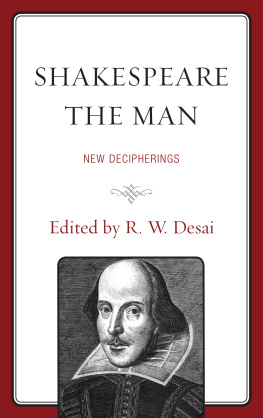

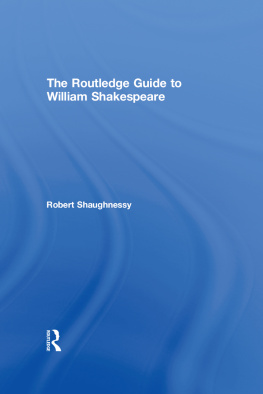


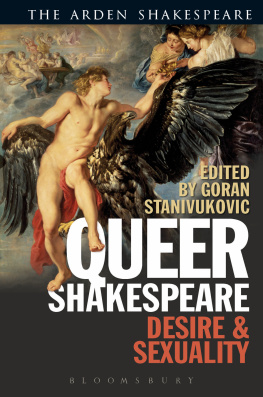

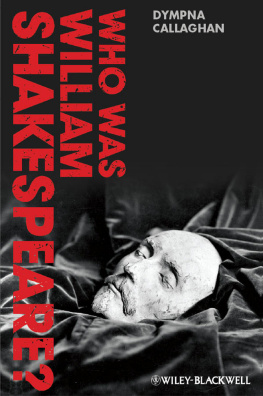
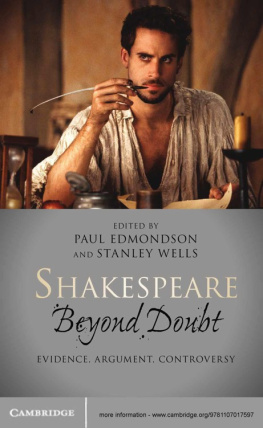

 TM The paper used in this publication meets the minimum requirements of American National Standard for Information Sciences Permanence of Paper for Printed Library Materials, ANSI/NISO Z39.48-1992.
TM The paper used in this publication meets the minimum requirements of American National Standard for Information Sciences Permanence of Paper for Printed Library Materials, ANSI/NISO Z39.48-1992.